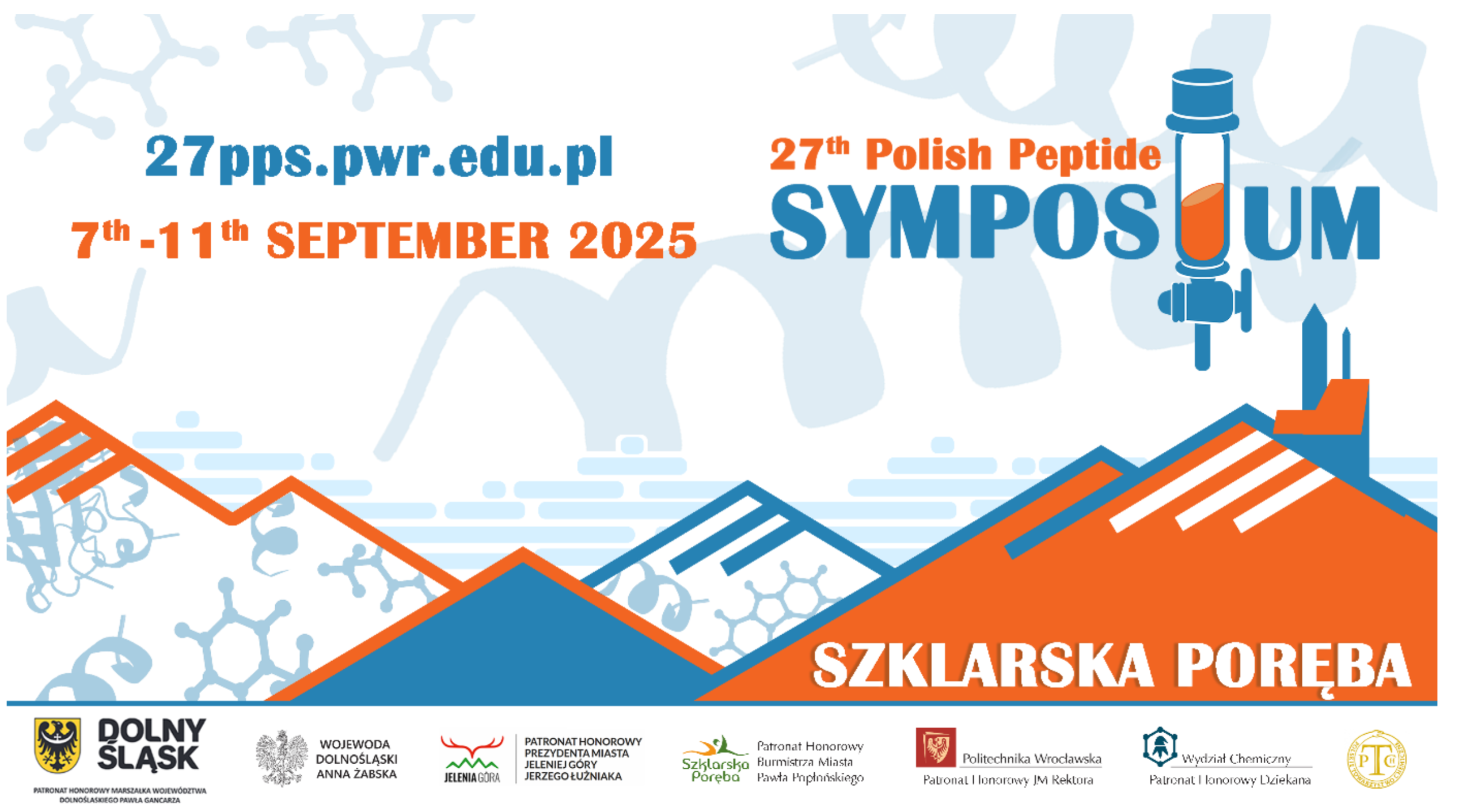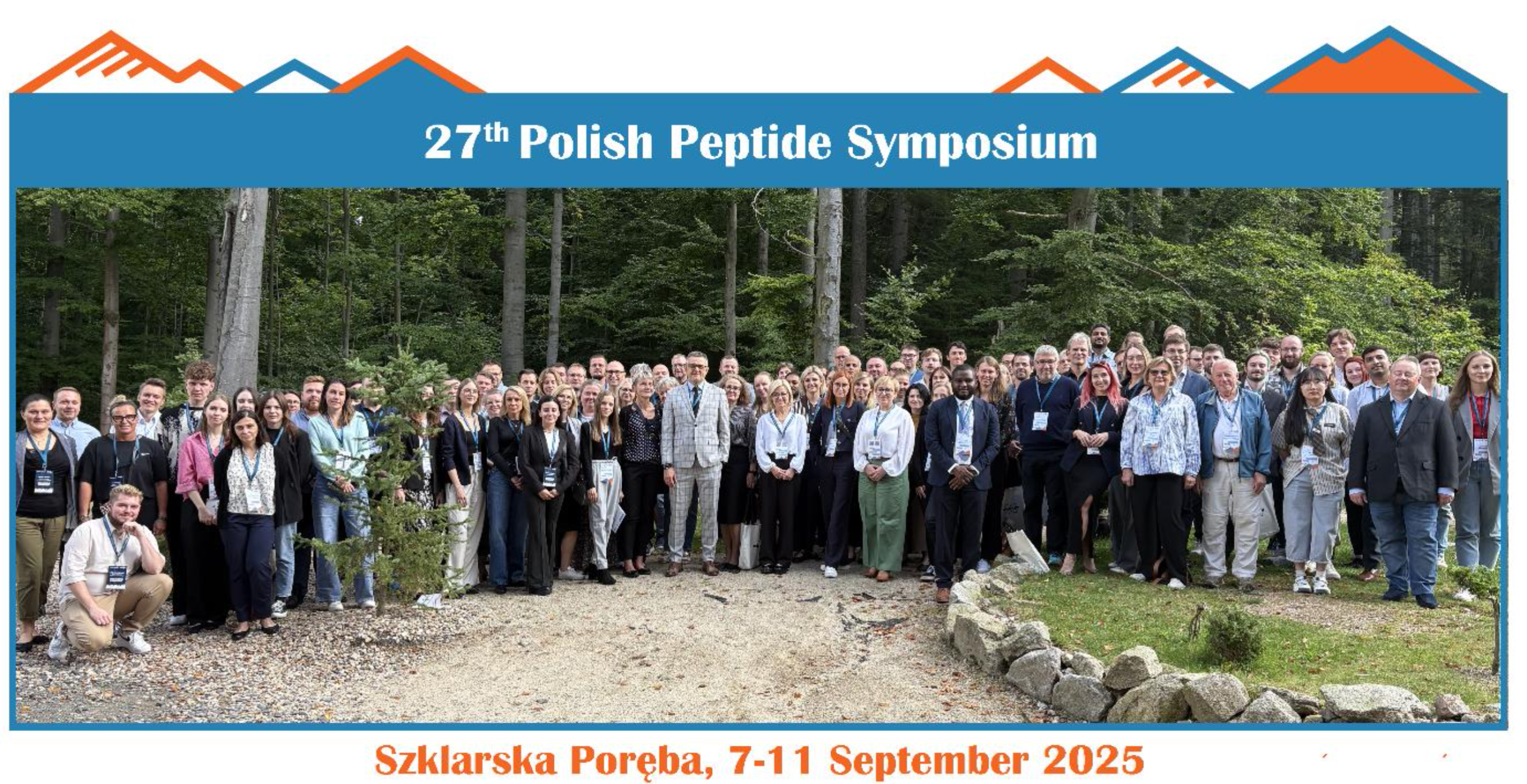CONFERENCE REPORT
27th Polish Peptide Symposium
Szklarska Poręba, Poland, 7 – 11 September 2025
Aim and scope of the conference
The Polish Peptide Symposium has been held biennially since 1967, organized by Polish research centers engaged in research on peptide and protein synthesis and biological activity. The conference is an important scientific event bringing together researchers from Poland and abroad, as well as representatives of industry, working not only in peptide chemistry but also in related fields such as biochemistry, medicinal chemistry, and structural chemistry.
The Polish Peptide Symposium provides a platform for exchanging experiences, research results, and ideas among groups active in peptide chemistry. It fosters the establishment of new collaborations, the expansion of existing networks, and offers opportunities for research teams to discuss ongoing projects. Another important aspect of the symposium is supporting young scientists in their professional development, not only by providing experience and networking opportunities but also through competitions dedicated to this group.
This year’s edition took place on September 7–11 at the Platinum Mountain Hotel in Szklarska Poręba. The main organizer was Prof. Marcin Sieńczyk, supported by the members of the Department of Organic and Medicinal Chemistry, Wrocław University of Science and Technology. Information on the Organising Committee as well as the Scientific Committee overseeing the scientific program is included in the Programme of Abstracts Book (attached to this report).
Participation and Scope
The conference was attended by 111 participants, the majority representing academia from 20 scientific institutions across five European countries. The participants included both established researchers and early-career scientists such as PhD students and students. The event also brought together representatives of 13 companies providing advanced solutions, equipment, and materials for the chemical and biochemical industries.
Among the invited speakers were internationally recognized researchers with strong scientific achievements, including Prof. Brice Korkmaz (Université de Tours, France), Prof. Steven Verhelst (KU Leuven, Belgium), and Prof. Adam Lesner (University of Gdańsk, Poland).
Conference program
The scientific program included:
Plenary session (September 8) with keynote lectures by invited guests:
- Prof. Brice Korkmaz (Université de Tours, France), First-in-Class Medicines Called Cathepsin C Inhibitors for the Treatment of Neutrophil-Mediated Diseases, presenting research that led to the development of a new drug for patients with Papillon-Lefèvre Syndrome.
- Prof. Adam Lesner (University of Gdańsk, Poland), Peptides as Diagnostic Tools, highlighting the development of diagnostic tools enabling sensitive and specific detection of pathological changes (e.g., cancer) based on body fluid analysis.
- Lecture sessions – From September 8 to 11, nine sessions were held, featuring a total of 42 oral presentations. The final session was dedicated exclusively to young researchers (PhD students). The best presentation, selected by the Scientific Committee, was awarded the Emil Taszner Prize, funded by the Chemat company.
- Poster presentations – 48 posters were presented during two sessions. Based on the research presented by young scientists, the Scientific Committee selected three posters for awards funded by Kamush.com company.
- Industry presentations – Several representatives of industry (sponsors) gave talks during Lecture sessions. Additionally, sponsors had the opportunity to present their products and services at exhibition booths located at the conference venue.
Role of sponsors, partners, and patrons
Financial and organizational support from companies and institutions played a crucial role in the success of the conference. Their involvement made it possible to:
- invite and host international speakers,
- prepare and print conference materials,
- organize competitions with prizes for young scientists,
- reduce participation costs for students and PhD students,
- arrange additional networking events, including the conference banquet.
We extend our sincere gratitude to all sponsors, partners, and patrons for their support and collaboration. Their contribution was essential not only in ensuring the high scientific standard of the event but also in creating a welcoming atmosphere that fostered integration between the scientific and industrial communities.
The 27th Polish Peptide Symposium was an inspiring scientific event that contributed to strengthening collaboration among research groups active in peptide chemistry and related fields. It also enabled valuable contacts between academia and industry. The support of sponsors, partners, and patrons was essential for achieving these goals and will be warmly remembered by both organizers and participants.
The Organizing Committee


